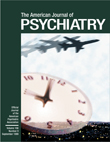Relationship of Panic Attacks to Paranoia
Mr. A was a 42-year-old man who had had schizoaffective disorder since he was 22 years old; he had five hospitalizations for psychosis, depression, and suicidality. Early in his illness, he heard voices threatening to cut off his genitals. He became convinced that his neighbor wanted to shoot him, so he attempted suicide “to die before they could…torture me.” Voices telling him that the Mafia was after him and that he was being watched and would be tortured continued episodically. Others sent their thoughts to him telepathically, he said. These symptoms were in good control on a regimen of clozapine, 200 mg/day, and lorazepam, 2 mg b.i.d., except when he had panic attacks.Mr. A had panic attacks with severe anxiety, shortness of breath, choking, racing heart, sweating, dizziness, light-headedness, chest pains, a feeling that he might lose control or “blow up,” and, occasionally, numbness and tingling. During these episodes, he had a return of paranoia, commonly reexperiencing the thoughts that his genitals would be cut off and that others were talking about him behind his back. He referred to these episodes as paranoid attacks.
References
Information & Authors
Information
Published In
History
Authors
Metrics & Citations
Metrics
Citations
Export Citations
If you have the appropriate software installed, you can download article citation data to the citation manager of your choice. Simply select your manager software from the list below and click Download.
For more information or tips please see 'Downloading to a citation manager' in the Help menu.
View Options
View options
PDF/EPUB
View PDF/EPUBGet Access
Login options
Already a subscriber? Access your subscription through your login credentials or your institution for full access to this article.
Personal login Institutional Login Open Athens loginNot a subscriber?
PsychiatryOnline subscription options offer access to the DSM-5-TR® library, books, journals, CME, and patient resources. This all-in-one virtual library provides psychiatrists and mental health professionals with key resources for diagnosis, treatment, research, and professional development.
Need more help? PsychiatryOnline Customer Service may be reached by emailing [email protected] or by calling 800-368-5777 (in the U.S.) or 703-907-7322 (outside the U.S.).

